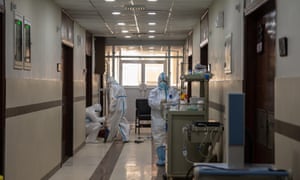Hannah Ellis-Petersen and Shah Meer Baloch
Patients are looking for a cure as the healthcare system is on brink of collapse, say doctors.
As coronavirus chaos has enveloped Pakistan, with hospitals overflowing, doctors dying and infections escalating at an unmanageable rate, a dangerous black market in blood plasma has emerged.
The blood plasma of recovered coronavirus patients is now being sold for upwards of £3,000 to those who are desperately looking for a cure, at a time when doctors say Pakistan’s healthcare system is on the brink of collapse.
Convalescent plasma is being trialled around the world as a possible treatment for the disease. It contains antibodies generated by the immune systems of people who have fought off the virus.
Doctors in government hospitals in Islamabad said they had witnessed transactions between patients and intermediaries. The Guardian has also seen multiple text messages between people across Pakistan who are buying and selling the plasma of recovered patients.
“The hospitals are not involved but I have seen deals happen in front of me,” said a doctor at a government hospital in Islamabad, who asked not to be named. “Usually a patient’s attendants or family will approach someone who has recovered, asking them to donate blood. When a certain amount is agreed as payment, usually between 200,000 and 800,000 rupees (£950-£3,800), they go to a private lab and extract the plasma, which is then ‘donated’ to the patients.”
He added: “I know a family of five who became Covid-19 positive and spent 3.5m rupees on blood plasma on the black market. They believe it’s a miracle cure.”
Sources at the federal investigation agency confirmed they were aware of the unregulated black market sales of blood plasma but that it was up to the police to investigate individual cases.
Doctors said that hospitals in Islamabad had also run out of vital drugs, such as dexamethasone which was recently proven to help in Covid-19 recovery, as well oxygen cylinders, because they had been stolen and were now being sold for 25 times the market price on the black market.
Pakistan now has one of the fastest infection rates in the world, with 185,000 confirmed cases and upwards of 5,000 new infections a day. The planning minister, Asad Umar, has said cases could multiply eightfold by the end of July and hit 1.2 million.
Lockdown restrictions were lifted in Pakistan on 18 May by the supreme court when it said the virus was “not a pandemic in Pakistan” and questioned why the fight to contain it was “swallowing so much money”.
The situation in Pakistan got so bad that the World Health Organization took the unusual step of writing to the government, instructing it to reimpose lockdown as the country had met none of the conditions for safely lifting it. Temporary lockdowns have since been imposed in the capital, Islamabad, as well as Lahore and Peshawar but only for a few days, owing to fears about the possible the impact on the already near-collapsed economy.
The despair among doctors is palpable. A doctor at the Pakistan Institute of Medical Sciences (PIMS), the largest government hospital in Islamabad, said not only had he not been paid for four months, but rife misinformation meant doctors were being accused of being part of a conspiracy to allow patients to die, so more money would be given to the Pakistan government by international health organisations like the WHO. Many doctors had been physically assaulted as a result.
“We have run out of beds, resources, manpower, energy and above all our efficiency has been greatly marred by our disappointment in our system,” he said.
“People blame us when a patient dies, claiming that we killed them for dollars from the WHO. A woman spat on me in the emergency room when I couldn’t revive her 16-year-old boy who died of respiratory failure due to covid. She shouted, ‘You sold your soul and killed my boy.’ You cannot imagine the pain it caused.”
Dr Fazal Rabbi, registrar at the Covid-19 ICU in PIMS said the hospital had run out of beds in both the intensive care and isolation wards, meaning critical patients were being turned away.
“This is a very alarming and frustrating situation for us, we are depressed due to the excessive stress and because so many of us are falling ill from the virus,” said Rabbi, who is also president of the Young Doctors Association (YDA) in Islamabad. More than 170 doctors and nurses in PIMS have been infected with the virus and the YDA has threatened to strike if conditions are not improved.
“So far, there are more than 7,000 doctors and paramedics from all around Pakistan who are diagnosed with Covid-19. We are all concerned that if we get infected with the virus there might not even be a bed or ventilator for us in our own hospital. I know a doctor in Lahore who died because no bed could be found for him.”
Dr Faisal Zeeshan Ranjha, who runs Razia Shafi hospital in the Punjab city of Gujranwala, said: “Covid-19 was mishandled and underestimated by the authorities in Pakistan. There are 185,000 positive cases but the actual figure must be in the millions. Every third patient is having symptoms.” He said there was “no testing, no data and no plan. We don’t even know when the peak will hit.”
Ranjha confirmed that hospitals were running out of oxygen cylinders, oxygen refill equipment and monitors to measure oxygen levels in the blood because they were being stolen and sold on the black market. “The health system has collapsed, the economy has collapsed as well,” he said. “It will be worse for us than polio.”


No comments:
Post a Comment